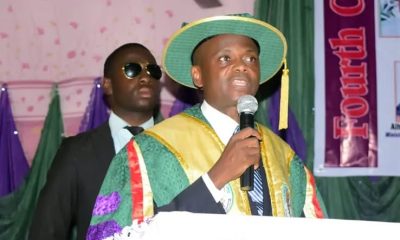Mr Mohammed Abdullahi, Minister of State for Science and Technology, has advocated implementation of the policies of Science, Technology and Innovation (STI) to fast track Nigeria’s industrialisation.
The Minister made the call at the Opening Ceremony of a three-day capacity building workshop on Tuesday in Abuja.
Mohamed expressed optimism that with such meticulous implementation, Nigeria would become one of the most industrialised nations of the world.
He said that the progress in the STI sector in the last eight years was due to policy implementation in areas such as solar technology, road research, biotechnology capacity development and many other crucial areas.
The minister stressed the need for the country to develop a bank and financial institution primarily for the purpose of funding Research and Development in STI area.
“To mitigate against the challenge of funding, the Ministry is strongly advocating the establishment of Research and Development (R&D) bank.
“This is to close the gap in the absence of venture capitals to support the commercialisation of R& D findings,” the Minister said.
On policy implementation, he noted that it was a bridge that allowed the objectives of public policies to be achieved and expressed as outcomes of government activities.
Mohammed further advocated for certain strategic actions for effective policy implementation.
These, he said, include awareness creation, developing monitoring indicators, garnering state level cooperation and ensuring stakeholder participation.
Earlier, Dr Dimitri Sanga, the Director, Dakar Regional office and Organisation of Islamic Corporation (OIC) Abuja Regional Office, said the COVID-19 pandemic was a wake-up call for member nations to invest and build robust STI eco-systems.
The Secretary General, Nigerian National Commission for UNESCO, Mr Olagunji Idowu, said that the capacity workshop would go a long way to properly reposition STI policies in the country.
The workshop was jointly hosted by the Federal Ministry of Science and Technology and the United Nations Educational, Scientific and Cultural Organisation (UNESCO).
It was centered on STI Policy making, Mapping and Review Methodologies to foster necessary interactions and exchange of knowledge.

 Latest3 days ago
Latest3 days ago
 Trends4 days ago
Trends4 days ago
 Energy1 week ago
Energy1 week ago
 Education1 week ago
Education1 week ago
 Business6 days ago
Business6 days ago
 Football6 days ago
Football6 days ago
 Featured6 days ago
Featured6 days ago
 Health5 days ago
Health5 days ago

